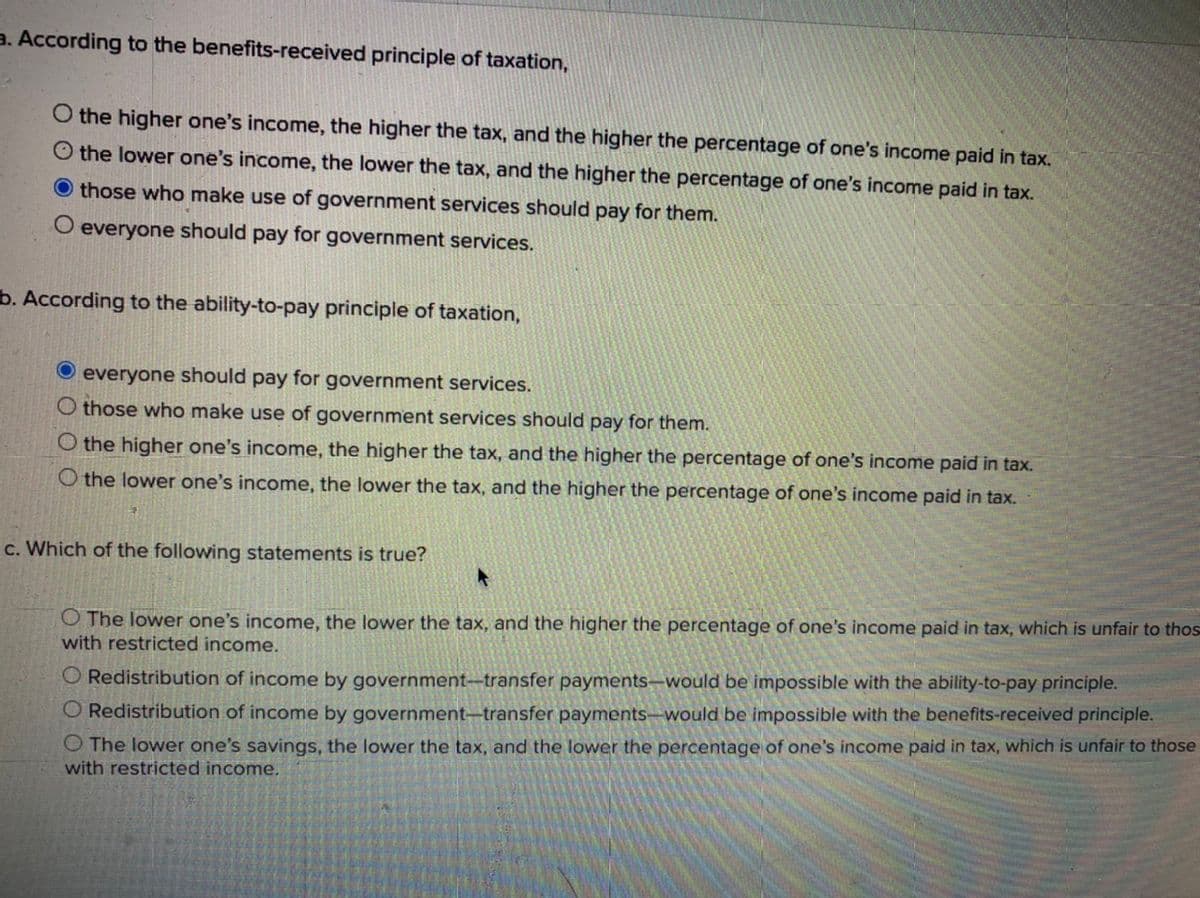a. According to the benefits-received principle of taxation, O the higher one's income, the higher the tax, and the higher the percentage of one's income paid in tax. O the lower one's income, the lower the tax, and the higher the percentage of one's income paid in tax. O those who make use of government services should pay for them. O everyone should pay for government services. b. According to the ability-to-pay principle of taxation, everyone should pay for government services. O those who make use of government services should pay for them. O the higher one's income, the higher the tax, and the higher the percentage of one's income paid in tax. O the lower one's income, the lower the tax, and the higher the percentage of one's income paid in tax. c. Which of the following statements is true? O The lower one's income, the lower the tax, and the higher the percentage of one's income paid in tax, which is unfair to tho with restricted income. O Redistribution of income by government-transfer payments-would be impossible with the ability-to-pay principle. O Redistribution of income by government-transfer payments-would be impossible with the benefits-received principle. O The lower one's savings, the lower the tax, and the lower the percentage of one's income paid in tax, which is unfair to those with restricted income.
a. According to the benefits-received principle of taxation, O the higher one's income, the higher the tax, and the higher the percentage of one's income paid in tax. O the lower one's income, the lower the tax, and the higher the percentage of one's income paid in tax. O those who make use of government services should pay for them. O everyone should pay for government services. b. According to the ability-to-pay principle of taxation, everyone should pay for government services. O those who make use of government services should pay for them. O the higher one's income, the higher the tax, and the higher the percentage of one's income paid in tax. O the lower one's income, the lower the tax, and the higher the percentage of one's income paid in tax. c. Which of the following statements is true? O The lower one's income, the lower the tax, and the higher the percentage of one's income paid in tax, which is unfair to tho with restricted income. O Redistribution of income by government-transfer payments-would be impossible with the ability-to-pay principle. O Redistribution of income by government-transfer payments-would be impossible with the benefits-received principle. O The lower one's savings, the lower the tax, and the lower the percentage of one's income paid in tax, which is unfair to those with restricted income.
Principles of Microeconomics
7th Edition
ISBN:9781305156050
Author:N. Gregory Mankiw
Publisher:N. Gregory Mankiw
Chapter6: Supply, Demand And Government Policies
Section: Chapter Questions
Problem 4PA
Related questions
Question

Transcribed Image Text:3. According to the benefits-received principle of taxation,
O the higher one's income, the higher the tax, and the higher the percentage of one's income paid in tax.
O the lower one's income, the lower the tax, and the higher the percentage of one's income paid in tax.
those who make use of government services should pay for them.
O everyone should pay for government services.
b. According to the ability-to-pay principle of taxation,
everyone should pay for government services.
O those who make use of government services should pay for them.
O the higher one's income, the higher the tax, and the higher the percentage of one's income paid in tax.
O the lower one's income, the lower the tax, and the higher the percentage of one's income paid in tax.
c. Which of the following statements is true?
O The lower one's income, the lower the tax, and the higher the percentage of one's income paid in tax, which is unfair to thos
with restricted income.
O Redistribution of income by government-transfer payments-would be impossible with the ability-to-pay principle.
O Redistribution of income by government–transfer payments–would be impossible with the benefits-received principle.
O The lower one's savings, the lower the tax, and the lower the percentage of one's income paid in tax, which is unfair to those
with restricted income.
Expert Solution
This question has been solved!
Explore an expertly crafted, step-by-step solution for a thorough understanding of key concepts.
This is a popular solution!
Trending now
This is a popular solution!
Step by step
Solved in 2 steps

Recommended textbooks for you

Principles of Microeconomics
Economics
ISBN:
9781305156050
Author:
N. Gregory Mankiw
Publisher:
Cengage Learning

Principles of Macroeconomics (MindTap Course List)
Economics
ISBN:
9781305971509
Author:
N. Gregory Mankiw
Publisher:
Cengage Learning

Principles of Microeconomics (MindTap Course List)
Economics
ISBN:
9781305971493
Author:
N. Gregory Mankiw
Publisher:
Cengage Learning

Principles of Microeconomics
Economics
ISBN:
9781305156050
Author:
N. Gregory Mankiw
Publisher:
Cengage Learning

Principles of Macroeconomics (MindTap Course List)
Economics
ISBN:
9781305971509
Author:
N. Gregory Mankiw
Publisher:
Cengage Learning

Principles of Microeconomics (MindTap Course List)
Economics
ISBN:
9781305971493
Author:
N. Gregory Mankiw
Publisher:
Cengage Learning

Principles of Economics (MindTap Course List)
Economics
ISBN:
9781305585126
Author:
N. Gregory Mankiw
Publisher:
Cengage Learning


Principles of Economics, 7th Edition (MindTap Cou…
Economics
ISBN:
9781285165875
Author:
N. Gregory Mankiw
Publisher:
Cengage Learning